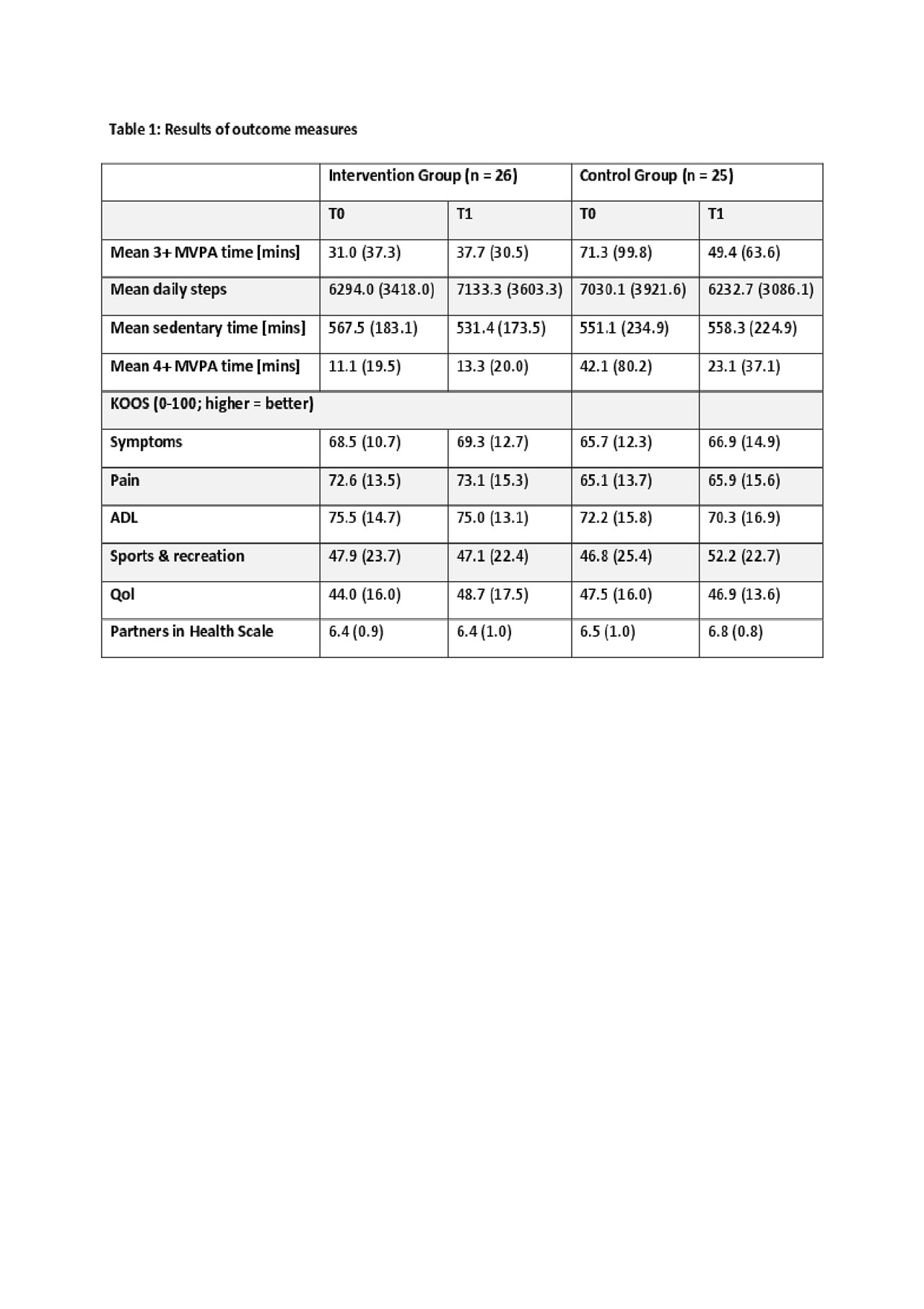Session Information
Date: Tuesday, November 12, 2019
Title: 5T098: Orthopedics, Low Back Pain & Rehabilitation (2798–2803)
Session Type: ACR/ARP Abstract Session
Session Time: 2:30PM-4:00PM
Background/Purpose: Current guidelines emphasize an active lifestyle in the management of knee osteoarthritis (OA), but up to 90% of OA patients are inactive. We previously demonstrated that an 8-week physical therapist (PT)-led counselling intervention, with the use of a consumer-grade wearable device, improved step count and quality of life in people with knee OA, compared to a control [1]. In the current study, we aimed to assess the efficacy of this intervention for improving activity participation and disease status in people with knee OA after the counselling component was withdrawn.
Methods: Eligible participants had a self-reported knee OA diagnosis, or symptoms of knee OA based on a validated questionnaire. After baseline assessment (T0) and randomization, the Intervention Group (IG) received standardized education, a Fitbit, access to FitViz (a personalized Fitbit compatible app), and 4 biweekly phone calls by a PT to counsel activity goals over an 8-week period. Participant then continued to use the Fitbit and FitViz app independently up to week 12. The Control Group (CG) received a monthly e-newsletter from the research team. Participants were assessed again at the end of 12 weeks (T1). The primary outcome was time in daily moderate/vigorous physical activity at >3 METS and in bouts of >10 mins (3+ MVPA) measured with a SenseWear® monitor. Secondary outcomes were: 1) daily step count, 2) MVPA at >4 METS and in bouts of >10 mins (4+ MVPA, reflects purposeful activities), 3) time in sedentary activity in bouts of >20 mins, 4) Knee Injury & OA Outcome Score (KOOS); 5) Partners in Health Scale (PIHS; measured self-management capacity). We used Analysis of Covariance (ANCOVA) to assess the effect of the intervention on the outcomes at T1 after adjusting for T0. The robust regression procedure (SAS proc robustreg) was used to limit the impact of outliers.
Results: We enrolled 51 participants (IG: n=26, 88.5% women; CG: n=25, 76.0% women). Both groups were similar in age [IG: 65.0 (8.3) years; CG: 64.8 (SD 9.0)] and body mass index [IG: 29.8 (SD 9.0); CG: 28.9 (SD 6.2)]. Table 1 summarizes the results. The CG accumulated significantly more 3+/4+ MVPA time at baseline. The adjusted mean difference in 3+ MVPA at T1 was 13.1 mins (95% CI: 1.6, 24.5, p=0.03). The secondary physical activity outcomes improved, although not statistically significant – step count: 1,106.5 (95% CI: -19.9, 2,232.9, p=0.05); 4+ MVPA: 1.6 mins (95% CI: -3.0, 6.1, p=0.50); sedentary time: -29.5 mins (95% CI: -75.8, 16.7, p=0.21). We found similar results in the KOOS and PIHS.
Conclusion: Our findings showed that the wearable-enabled intervention improved physical activity in people with knee OA 4 weeks after the counselling component ended. Further research will be required to examine the effectiveness of this intervention for promoting long-term physical activity and improving health outcomes.
[1] Li et al. JMIR 2018; 20(4):e159.
To cite this abstract in AMA style:
Xie H, Li L, Lu N, Gromala D, Shaw C, Backman C, Tam J, Gregory N, Avina-Zubieta J, Hoens A, Townsend A, Feehan L. Efficacy of a 3-Month Wearable-enabled Physical Activity Counselling Program for People with Knee Osteoarthritis [abstract]. Arthritis Rheumatol. 2019; 71 (suppl 10). https://acrabstracts.org/abstract/efficacy-of-a-3-month-wearable-enabled-physical-activity-counselling-program-for-people-with-knee-osteoarthritis/. Accessed .« Back to 2019 ACR/ARP Annual Meeting
ACR Meeting Abstracts - https://acrabstracts.org/abstract/efficacy-of-a-3-month-wearable-enabled-physical-activity-counselling-program-for-people-with-knee-osteoarthritis/

